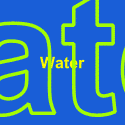|
|
home • e-mail |
Quick Links
|
About Our Communities, Our WaterTwenty years from now (if not already) wars will be fought somewhere in this world over the issue of water. This is how important this issue is on the world stage and this is why we must begin putting the issue of globalization and control of water on the front burner for both social justice and good government activists all over the country. Many of us believe that “water is a basic human need, and therefore a right, and should not be treated as a commodity.” Corporations and those who believe in the corporate model deny this and will do whatever it takes to move the issue of control over water into the market forces that worship one basic principle that those who have money will always be making decisions for those without. What oil is in today's geopolitical framework, water will soon become. The World Bank has predicted that by 2025, 2/3 of the world's population will run short of fresh drinking water. The bottom line is that corporations want a piece of the $82 billion dollar U.S. market (9.3 billion is the bottled water industry) ($400 billion dollar market worldwide, including the $35 billion dollar bottled water industry) Over the last decade we have seen a significant rise in attempts by multi-national corporations to gain control over one of the last great sources of available public funds, local municipal budgets. Almost every community has begun the slow devolution from the public sector model to the corporate model. The process of globalization has accelerated this push for privatization, and the threat to publicly owned and operated water delivery system grows every day. This has most recently been made clear in communities such as Lawrence, Lee, and Holyoke, MA and there seems to be no retreat from these resource grabs. With promises of greater efficiency and cost savings for strapped communities, corporations have begun making in-roads into what has always been a relative safe haven for local control and autonomy. However under scrutiny, these promises do not hold up and instead threaten communities with higher water rates, lack of local accountability, loss of community jobs, and threaten community water conservation programs. (Under privatization, the incentive to promote conservation is lost as corporations try to maximize their profits) But as shown in the communities of Lawrence, Lee, and Holyoke, (as well as many lesser known examples in the state) once the facts are brought into the light, the community almost overwhelmingly chooses to maintain local control and accountability. Our project work with "Our Communities, Our Water" will aid in the education of local communities around this issue and ensure that every community faced with this issue will be well informed before they choose their respective path. |
|
MassGlobalAction • 33 Harrison Ave. 5th Floor, Boston, MA 02111 • (t) 617-482-6300 (f) 617-482-7300 |
